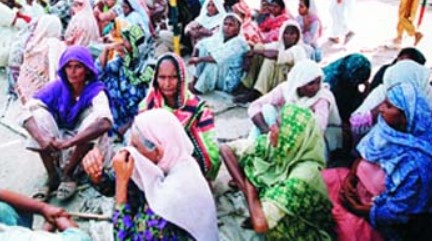Centennial Struggle for Khanewal Peasant Land Rights
Faisal Saleem
Khanewal: The farmers in 1880 began cultivating the uninhabited lands of Pirowal with the verbal understanding that the land would become their property after 15 years of cultivation, but after 111 years and movement activities, this promise was not fulfilled.
The struggle for rights traces back to the Mughal Emperor Akbar era, when Dulla Bhatti of Pindi Bhatti took practical measures against illegal ransom and state oppression on behalf of the Emperor, supported by women like Mai Ladhi, his mother. This legacy persisted into British rule, highlighted by the significant boycott of canal water in 1939.
Pirowal, a suburb of Khanewal, was once an uninhabited area settled by local and non-local people. In 1912, the British government promised the settlers that if they cultivated the land regularly, it would be transferred to them after 15 years.
The resident of 83/10R Mian Fiaz Kamboh said that his great-grandfather was allotted the land he currently cultivates before partition. Fiaz mentioned that his father complained of exploitation by the Punjab Seed Corporation (PSC), which inflated labour and crop expenses on paper. If the crop expenditure was around 80,000 at the market rate, it was shown as over 150,000 on paper. Despite these irregularities, farmers managed to save some money (Rs 20-30,000) from each biennial crop.
Establishment of Anjuman Muzareen
Weekly newspaper Shab-o-Roz Editor Imtiaz Ali Asad shared the history of ‘Tenants Association of Punjab’ aka Anjuman Muzareen Punjab (AMP). In the early 1900s, the British government allocated 160,000 acres of land to the army and farmers for farming, with 68,000 acres in present-day Punjab. Presently, Khanewal farmers cultivate 6269 acres of land.
In 1920, the British Cotton Growers Association (BCGA) acquired these lands from the British government for 100 years, initially on a 20-year lease. The lease was extended in 1941 and 1961 while the farmers worked under a system of ransom. The farmers had an agreement with BCGA that all expenses would be covered by the organization, and profits after deducting expenses would be shared equally between both parties.
After the establishment of Pakistan in 1947, the same farmers advocated for change, leading to agricultural reforms in 1958-59 and 1962-63. The most significant reforms occurred in 1973, following the approval of the country’s new constitution.
The Land Reforms Ordinance of 1972 aimed to dismantle the feudal system by setting land ownership limits, redistributing land to landless peasants, and granting ownership rights to farmers and peasants, thereby addressing socio-economic inequality in rural areas.
After the nationalization of private institutions during the Bhutto era, the
Punjab Seed Corporation (PSC) was established in Khanewal in 1976; its scope of work was limited to 81/10R, 82/10R, 86/10R, and 87/10R. Later in 1983, three more villages’ 83/10R, 85/10R, and 75/10R also came under the scope of the corporation.
Peasants were permitted to cultivate the land under the condition that they used seeds and materials provided by the PSC and sold their crops exclusively to PSD. The PSC covered the costs, and upon harvest, the Seed Corporation purchased the crop. A 60 per cent of the profit went to the farmers, while 40 per cent went to the PSC.
Challenges and Resistance
In 1990, local farmers filed a case for independent cultivation allotment with the Federal Land Commission in Islamabad. The commission ruled in favour of the farmers, stating that land cultivation allotments should be restored in the names of the farmers already cultivating the land.
Anjuman Muzareen urged the district administration to promptly implement the commission’s decision. However, for 19 days, the administration took no action on the matter, leading the PSC to oppose the decision. In 1992, the decision went against the peasants, forcing them to continue working under the PSC.
In 1998, Ghulam Abbas Sial noted a worsening situation as efforts were made to persuade peasants to relinquish their rights and work as tenants. AMP initiated a boycott against the PSC, declaring they would neither accept seeds nor give them their crops. They opted to address their concerns directly with the provincial government, ultimately achieving success.
Farmers established Anjuman Muzareen in Khanewal in 2001 to advocate for land rights. They demanded that the government fulfil promises and court decisions by transferring ownership of the 12.5 acres of land they had been cultivating for decades.
‘Sardaran Mai’ was included to represent women in the movement and appointed head of the female security force tasked with protecting movement workers. This force shielded male participants in demonstrations from police violence and arrest, while also responding to illegal police actions.
Read More:https://thepenpk.com/pirowal-forest-a-story-of-neglect-and-environmental-loss/
Mai has dedicated 71 years of her life to the village, where six generations of farmers have worked the land, with 509 families investing in it. During this time, she faced eight FIRs (First Information Report), while the president faced 56.
In 2007, continuous protests by Anjuman Muzareen led the Punjab government to establish a committee chaired by Minister of Agriculture Mian Manzoor Watto and local parliamentarians. The committee recommended awarding all peasants 10 acres of land, but the association rejected this, insisting on receiving the same amount of land they already cultivated.
Political Indifference
On March 23, 2008, Anjuman Muzareen blocked the highway and railway track in Pirowal, turning areas like 83/10R and 85/10R into battlegrounds. Local police dragged protesters through the streets and harassed women. An 82-year-old Raza Thahim was killed by a gunshot, and a 12-year-old child Jahanzeb was injured. Police also raided villages, burning personal property and tractors in an attempt to crush the movement, but without success.
The state’s efforts to suppress the Muzareen movement in Okara were widely known. They announced a long march in 2010, prompting the Punjab government to form a committee headed by Ushar and Zakat Department Minister Malik Nadeem Kamran. Another committee was formed in 2014, led by the Public Works Department Minister Malik Nadeem Kamran, including secretaries of all departments and five Anjuman Muzareen office bearers. However, this committee failed to reach a decision until 2018.
With the formation of a new government in 2018, a series of meetings between Anjuman Muzareen and Management and Professional Development Minister Hussain Jahanian Gurdizi began. Despite three and a half years in power, no decisions were made.
In this regard, former Provincial Minister Malik Nadeem Kamran stated that despite the efforts of the committee, it was unable to decide this case due to legal complications and it still takes a lot of time to resolve.  PSC Khanewal Assistant Firector Farms Muhammad Zeeshan mentioned that the corporation provided various facilities to farmers, including high-quality and free seeds, free spray for seed quality, fertilizer on loan, 30 tractors available 24/7 (without fuel), and interest-free funds for child marriage. Additionally, the corporation purchased crops directly, reducing middleman exploitation.
PSC Khanewal Assistant Firector Farms Muhammad Zeeshan mentioned that the corporation provided various facilities to farmers, including high-quality and free seeds, free spray for seed quality, fertilizer on loan, 30 tractors available 24/7 (without fuel), and interest-free funds for child marriage. Additionally, the corporation purchased crops directly, reducing middleman exploitation.
After assessing crop value and deducting expenses, the remaining amount was given to peasants. The land and farmers were transferred from the Department of Agriculture to the Punjab Seed Corporation, leaving farmers categorised as “illegal occupiers” for not paying ransom to the government.
Mahar Ghulam Abbas Sial countered PSC’s claims, stating that the facilities weren’t entirely free. PSC deducted expenses from crop income and claimed half of the profit. Tired of corruption, Anjuman Muzareen fought for their rights. Sial recalled a dispute in 1998 when he received only Rs 13,000 from a 12.5-acre crop after deducting expenses and the company’s share.
The PSC’s accounts department staff dismissed the farmers’ association’s concerns, insisting that the organization has been providing better facilities to farmers. They noted that in the 1990s, farmers typically saved around 40,000 rupees per crop. Immediate wheat and money were provided based on farmers’ needs, which were later deducted when the seasonal crop was ready.
High Court Advocate Nauman Yunus clarified that government land cannot be allocated to individuals or Anjuman Muzareen without an official notification from the Punjab Government. Despite verbal promises of land ownership to Anjuman Muzareen after a few years, this has no legal standing.Therefore, transferring the land to Muzareen is not possible at present.
Haqooq Khalq Party Pakistan General Secretary Farooq Tariq said that there are many stories of British rule in which the local people were cheated by such fake promises, while this land is the right of the peasants from a social and moral point of view.
If the state wants quality seeds and a real agricultural revolution, it should directly subsidise these farmers and not involve the corporate sector in agriculture, Tariq added.
Unwavering Resolve
General Secretary believes that the Anjuman Muzareen Pakistan movement has largely succeeded in claiming its rights, as peasants have stopped paying ransom to the government after a century of cultivation. However, the government’s approach of targeting movement activists instead of resolving the issue through legal means raises questions.
Farooq Tariq is optimistic about the movement’s success. He cited our neighbouring country where continuous tractor marches overturned laws favouring corporate farming. Similarly, during the Bhutto era, agricultural reforms occurred due to the efforts of local peasant organizations.
While politicians at local and national levels are aware of the peasants’ plight, no political party seems genuinely committed to solving their problems. The struggle of Anjuman Muzareen continues unabated, driven by the conviction that the land they cultivate is rightfully theirs and a promise made to them must be honoured. The farmers are determined to continue their struggle until their goal is achieved, regardless of government actions.

Comments are closed.